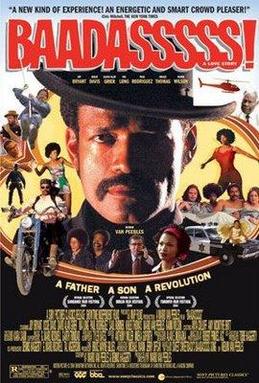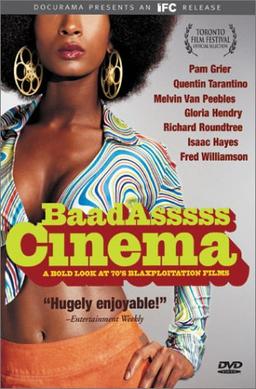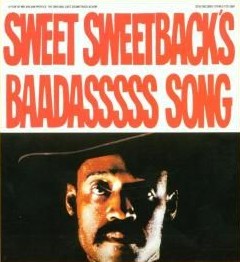
Melvin Van Peebles was an American actor, filmmaker, writer, and composer. He worked as an active filmmaker into the 2000s. His feature film debut, The Story of a Three-Day Pass (1967), was based on his own French-language novel La Permission and was shot in France, as it was difficult for a black American director to get work at the time. The film won an award at the San Francisco International Film Festival which gained him the interest of Hollywood studios, leading to his American feature debut Watermelon Man, in 1970. Eschewing further overtures from Hollywood, he used the successes he had so far to bankroll his work as an independent filmmaker.

Mario Van Peebles is an American film director and actor best known for appearing in Heartbreak Ridge in 1986 and known for directing and starring in New Jack City in 1991 and USS Indianapolis: Men of Courage in 2016. He is the son of actor and filmmaker Melvin Van Peebles, whom he portrayed in the 2003 biopic Baadasssss!, which he also co-wrote and directed.

Sweet Sweetback's Baadasssss Song is a 1971 American independent blaxploitation action thriller film written, co-produced, scored, edited, directed by, and starring Melvin Van Peebles. His son Mario Van Peebles also appears in a small role, playing the title character as a young boy. The film tells the picaresque story of a poor black man fleeing from the white police authorities.

Baadasssss! is a 2003 American biographical drama film, written, produced, directed by, and starring Mario Van Peebles. The film is based on the struggles of Van Peebles' father Melvin Van Peebles, as he attempts to film and distribute Sweet Sweetback's Baadasssss Song, a film that was widely credited with showing Hollywood that a viable African-American audience existed, and thus influencing the creation of the Blaxploitation genre. The film also stars Joy Bryant, Nia Long, Ossie Davis, Paul Rodriguez, Rainn Wilson, and Terry Crews.
Rhetta Hughes is an American soul singer and musical theatre and occasional screen actress.

Watermelon Man is a 1970 American comedy film directed by Melvin Van Peebles and starring Godfrey Cambridge, Estelle Parsons, Howard Caine, D'Urville Martin, Kay Kimberley, Mantan Moreland, and Erin Moran. Written by Herman Raucher, it tells the story of an extremely bigoted 1960s-era white insurance salesman named Jeff Gerber, who wakes up one morning to find that he has become black. The premise for the film was inspired by Franz Kafka's Metamorphosis, and by John Howard Griffin's autobiographical Black Like Me.

The Story of a Three-Day Pass is a 1967 film written and directed by Melvin Van Peebles, based on his French-language novel La Permission. It stars Harry Baird as a black American soldier who is demoted for fraternizing with a white shop clerk in France.

BaadAsssss Cinema is a 2002 TV documentary film directed by Isaac Julien. Julien looks at the Blaxploitation era of the 1970s in this hour-long documentary.
Cinemation Industries was a New York City-based film studio and distributor owned and run by exploitation film producer Jerry Gross.

What the...You Mean I Can't Sing?! is the fourth studio album by Melvin Van Peebles. Released in 1974, this album marks the first traditional music effort by Van Peebles. Previously, Van Peebles released the experimental spoken word albums Brer Soul, Ain't Supposed to Die a Natural Death and As Serious as a Heart-Attack.

Ghetto Gothic is the fifth studio album by Melvin Van Peebles. Released in 1995, this album marks the second traditional music effort by Van Peebles, after What the....You Mean I Can't Sing?! Previously, Van Peebles released the experimental spoken word albums Brer Soul, Ain't Supposed To Die a Natural Death and As Serious as a Heart-Attack.

Sweet Sweetback's Baadasssss Song is the soundtrack to Melvin Van Peebles' 1971 feature film of the same name. The soundtrack was performed by then-unknown Earth, Wind & Fire and released in 1971 on Stax Records. To attract publicity for the film without spending significant money, the soundtrack was released before the movie; it performed well, reaching No. 13 on the Billboard Top R&B Albums chart.

Blaxploitation is an ethnic subgenre of the exploitation film that emerged in the United States during the early 1970s, when the combined momentum of the civil rights movement, the Black power movement, and the Black Panthers spurred black artists to reclaim power over their image, and institutions like UCLA to provide financial assistance for students of color to study filmmaking. This combined with Hollywood adopting a less restrictive rating system in 1968. The term, a portmanteau of the words "black" and "exploitation", was coined in August 1972 by Junius Griffin, the president of the Beverly Hills–Hollywood NAACP branch. He claimed the genre was "proliferating offenses" to the black community in its perpetuation of stereotypes often involved in crime. After the race films of the 1940s and 1960s, the genre emerged as one of the first in which black characters and communities were protagonists, rather than sidekicks, supportive characters, or victims of brutality. The genre's inception coincides with the rethinking of race relations in the 1970s.

Ain't Supposed to Die a Natural Death is a 1971 album by Melvin Van Peebles, featuring mostly spoken word poetry over music written by Van Peebles. Some of its material was used in later projects such as the stage musical of the same name and Sweet Sweetback's Baadasssss Song. Note that this is an album of original material, not to be confused with the soundtrack LP released for the musical itself.
Classified X is a 1998 French-US documentary movie written by Melvin Van Peebles, directed by Mark Daniels and narrated by Van Peebles, that details the history of black people in American cinema throughout the 20th century. According to the review in Variety:
"... Van Peebles' distinctive analyses and his ever-growing importance to new black helmers via 1971's breakthrough Sweet Sweetback's Baadasssss Song make this a package with shelf life for cinematheques, schools and select broadcaster webs.... Scaredy-cat comedy-relief types, jungle "savages," mammies and minstrels gave way after World War II to "The New Negro" -- a put-upon "keeper of conscience" for the white protagonists. Pic briefly exits Hollywood to consider the independent black cinema that flourished -- with strict low-budget bounds -- from silent days till the late '40s, supported by a network of blacks-only theaters."

Xenon Pictures is an American film production and distribution company which releases titles produced by African-American filmmakers for African-American audiences. The label has distribution deals with numerous prominent filmmakers, such as Melvin Van Peebles, Rudy Ray Moore, Jamaa Fanaka, Ralph Bakshi and Perry Henzell.

How to Eat Your Watermelon in White Company (and Enjoy It), is a 2005 documentary film directed and written by Joe Angio, and produced by Michael Solomon. The film follows Melvin Van Peebles through his illustrious musical, acting, and directing career. The name comes from a controversial article that Van Peebles wrote, but never got published. Joe Angio, the director received four nominations for his film. Three of these nominations were for best documentary at the Chicago International film festival, and one nomination was at the Los Angeles Film Festival for best documentary feature.
Robert Maxwell was an American cinematographer known for his work on B movies, pornography, and exploitation films of the 1960s and 1970s. His best-known credits include Melvin Van Peebles' Sweet Sweetback's Badasssss Song and Don't Play Us Cheap.
Don't Play Us Cheap is a musical with music, lyrics, and a musical book by Melvin Van Peebles. The musical is based on Van Peebles' 1967 French-language novel La fête à Harlem (1967). Set in Harlem, the musical premiered in November 1970 at San Francisco State College.
Melvin Van Peebles was an American actor, filmmaker, writer, and composer. Over his career he recorded several albums with various musicians, and also recorded soundtracks.













